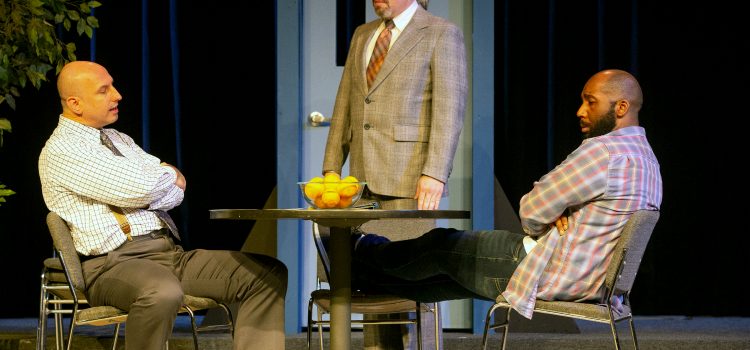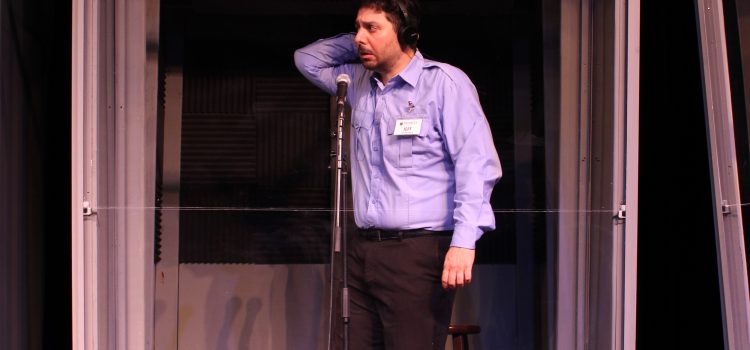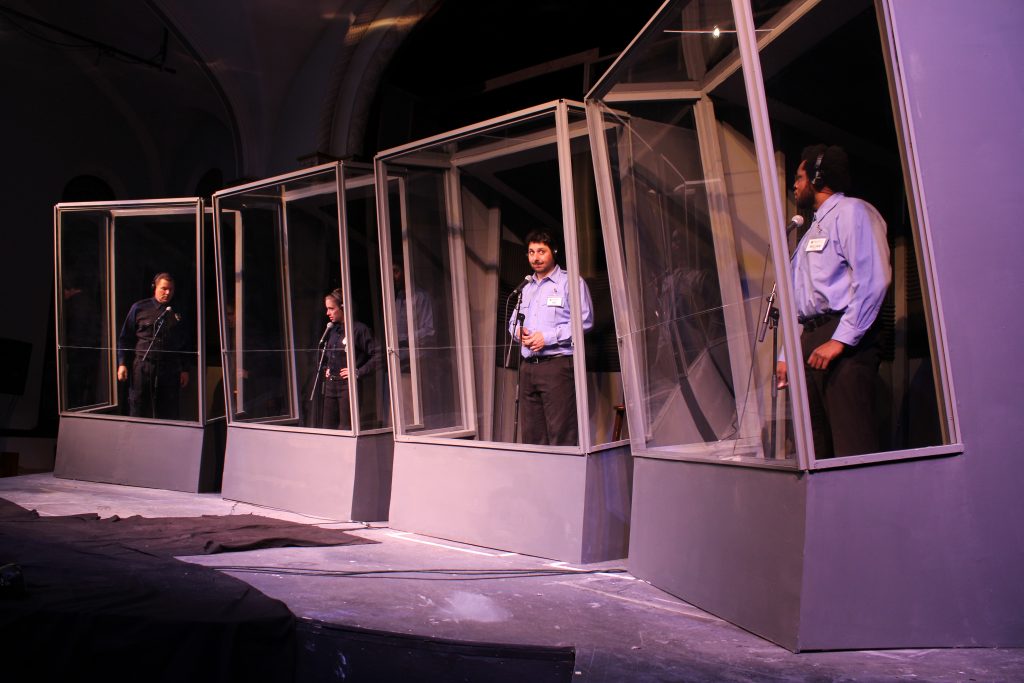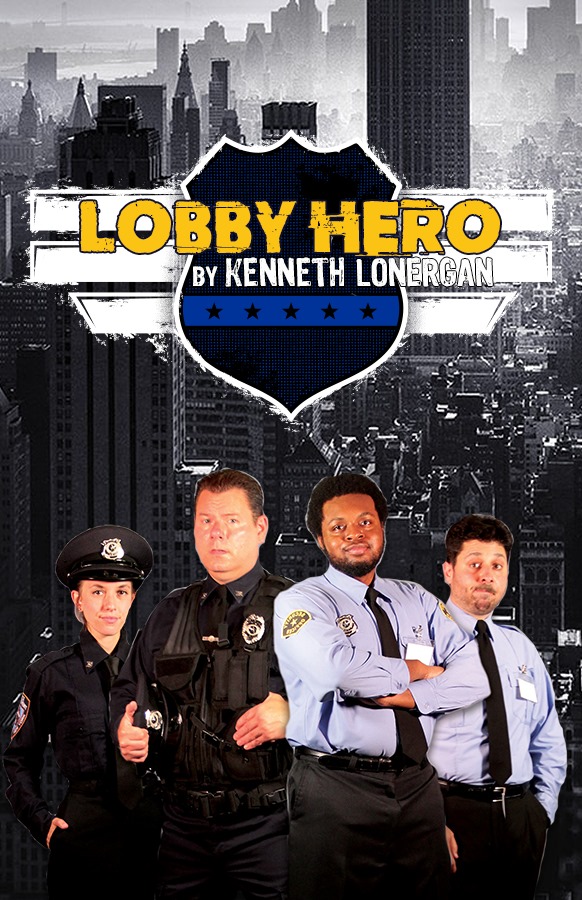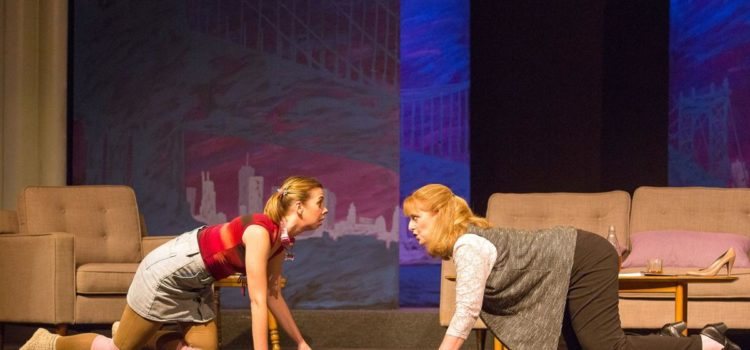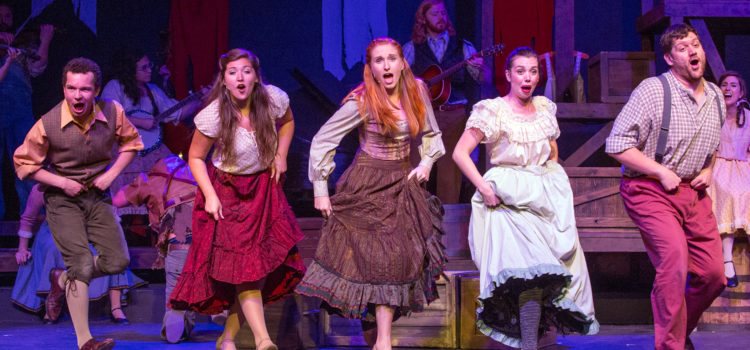By Lynn Venhaus
Three actors deliver brilliantly nuanced performances in “Blue/Orange,” a multi-layered satirical comedy-drama that focuses on madness, health care and race within a framework of frustrating bureaucracy and power struggles.
William Humphrey, Ben Ritchie, and Jason Meyers turn in some of their best work by grasping every shifting thought, trigger and changing attitude in conversations that blur lines on mental health.
The discourse is hefty and the roles demanding, for the characters are opaque. Allegiances switch as reasoning seems plausible – but one can’t ever be certain in these fiery exchanges.
Stray Dog Theatre is presenting this intellectually stimulating material as its first indoor show inside the Tower Grove Abbey, their longtime home, in 2021. With a contemporary focus that is more tragic than comic, that tone suits the production’s interpretation of this thorny material.
Shrewdly written by British playwright Joe Penhall, known primarily for several “fringe” works, and set in a UK institution, the play, first staged by the National Theatre in 2000, went on to win the Laurence Olivier Award for Best New Play, with Bill Nighy, as Robert, and Chiwetel Ejiofor as Christopher, nominated for several acting awards.
(More fun facts: Andrew Lincoln played Bruce and the three moved on to the London West End in 2001. The next year, the show opened off-Broadway, with Harold Perrineau Jr. as Christopher, and an acclaimed British revival in 2016 starred Daniel Kaluuya as the patient.)
Stray Dog has wisely decided to forego British accents, so that we are not distracted from the dense amount of dialogue that rapidly volleys back and forth.
The day before Christopher (William Humphrey) is supposed to be discharged from a psychiatric ward, his doctor (Jason Meyers) begins to have reservations that he shouldn’t be released. He shares his concerns with a senior colleague (Ben Ritchie).
Practically jumping for joy as the hyper Christopher, Humphrey is gleefully ready to go – and already packed. He still insists his father is former Ugandan dictator Idi Amin Dada Oumee and sees the pulp inside an orange as blue. In his mind, is this real or delusional? Thus begins a bureaucratic battle.
As the now confused patient becomes increasingly agitated, is he having an acute psychotic episode or is he being unduly provoked? What must happen to prevent him from leaving?
Christopher was diagnosed with a borderline personality order, and on day 28 at the London National Health Service mental hospital, he is due for release – unless a diagnosis changes.
As Dr. Bruce Flaherty, Meyers sees red flags and makes a convincing case that Christopher could be a paranoid schizophrenic. His superior, Dr. Robert Smith, doesn’t detect it. Exuding authority and clinical acumen. Ritchie recites reasons why psychiatry can fail black men like Christopher. After all, Dr. Smith is writing a book – interesting! – on the cultural and ethnocentrism factors that come into play in these situations.
Perhaps drum beating and seeing himself as a “white savior,” the imperious Robert thinks Christopher should return to his neighborhood for the cultural support – even though he lives alone and doesn’t know that many people. Sure, his behavior is odd, but is it cause for alarm?
Smith is worried that if Christopher stays longer, he could get worse and thus begin a never-ending cycle — or is that more of a reflection on the lack of beds and prevalent bottom-line thinking?
Christopher would really like to return to Africa, where he says he has a job, but will settle for his diverse London borough neighborhood if it means his freedom. And there is a probable threat of being attacked by racist thugs, so his fear seems real, but is it indicative of instability – and is pompous Robert being patronizing?
England’s cultural population includes Caribbean and African expatriates, and there are statistics that more black people, percentage wise, are in mental and penal institutions.
And what exactly causes seemingly stable Bruce’s third-act meltdown – and earlier blurting out the “N” word, which could fill an entire act with discussion. This really complicates the narrative, not just exposing an ugly prejudice and stereotypical thinking.
However, the roots of the problems are in the eye of the beholder. As the two professionals argue, drawing Christopher, pawn-like, into a tug of war of damaging rhetoric – clearly emotional scars are being inflicted.
Is this in any way beneficial and do the doctors think this will advance their careers?
Penhall’s incendiary words, written more than two decades ago, seems as urgent now as they were relevant then. This is a living, breathing work that changes direction throughout its two acts, and the verbal dexterity required is admirable.
In a bracing portrayal, Humphrey straddles the line of helpless vulnerability and angry advocate for getting his life back on track. Both instinctive, Ritchie and Meyers convincingly earn and lose their characters’ credibility.
Associate Artistic Director Justin Been deftly moves the actors around so that we are caught off-guard as characters reveal their positions, transferring the ‘edge’ around – and the performers never get ahead of the script, not tipping their hand about what’s next.
The cast has smartly constructed their roles. It’s an exemplary showcase of control, and lack of, as perceptions differ and speeches flow.
“Blue/Orange” could have easily turned preachy but keeps its intensity, although the second act gets weighed down somewhat with repetitive opinions. And while it’s not predictable, the ending may not satisfy those who have become invested in Christopher’s well-being.
Besides directing, Been also designed the claustrophobic set and the sound, and both he and Artistic Director Gary F. Bell gathered the props. Lighting designer Tyler Duenow maintained the setting’s institutional glare.
The hell that is the ever-present boondoggle for those suffering from mental illness shows no sign of improvement in today’s uncertain world. As this riveting production demonstrates, it’s a difficult subject to ponder, and “Blue/Orange” daringly takes a stand.
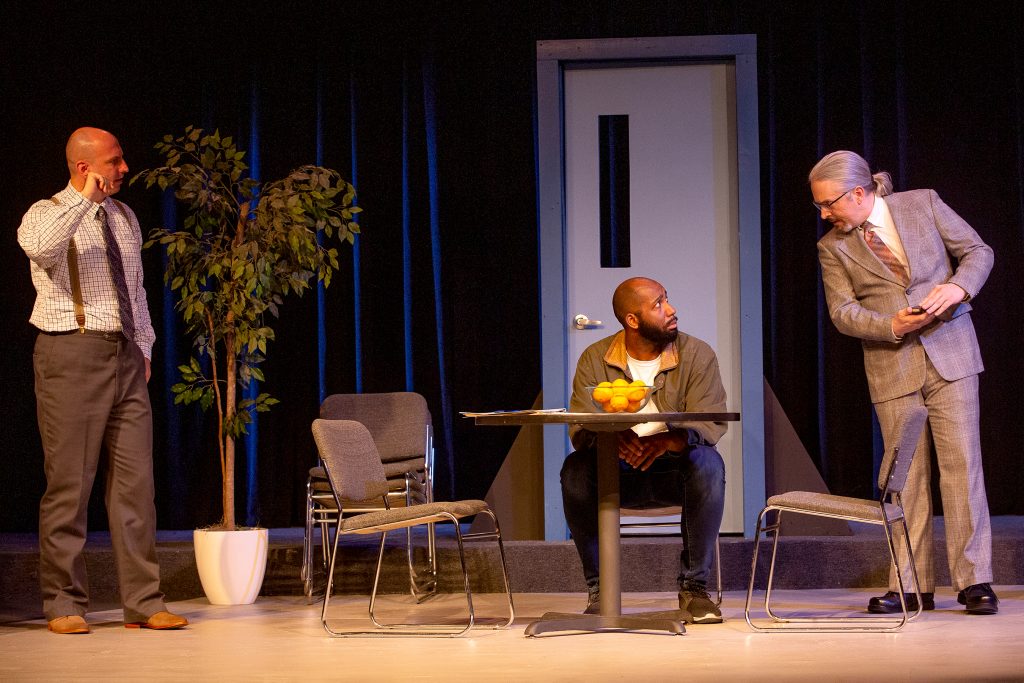
“Blue/Orange” is presented Thursday through Saturday, Oct. 7-9, 14-16 and 21-23 at 8 p.m., with a 2 p.m. matinee on Sunday, Oct. 17, at the Tower Grove Abbey, 2336 Tennessee Avenue, St. Louis, 63104.
Limited tickets are available because of physical distancing throughout the theater. For more information or tickets, visit www.straydogtheatre.org, or call 314-865-1995.
Safety precautions because of the COVID-19 public health crisis are in place for guests, actors, and staff. Masks are required to be worn by all guests, regardless of vaccination status. Stray Dog Theatre recommends, but does not require, that all guests be vaccinated. The up-to-date guidelines can be found on their website.

Lynn (Zipfel) Venhaus has had a continuous byline in St. Louis metro region publications since 1978. She writes features and news for Belleville News-Democrat and contributes to St. Louis magazine and other publications.
She is a Rotten Tomatoes-approved film critic, currently reviews films for Webster-Kirkwood Times and KTRS Radio, covers entertainment for PopLifeSTL.com and co-hosts podcast PopLifeSTL.com…Presents.
She is a member of Critics Choice Association, where she serves on the women’s and marketing committees; Alliance of Women Film Journalists; and on the board of the St. Louis Film Critics Association. She is a founding and board member of the St. Louis Theater Circle.
She is retired from teaching journalism/media as an adjunct college instructor.

